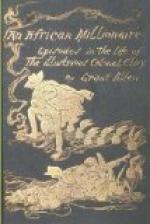“Remember me most kindly to your charming family, give Wentworth my love, and tell Mlle. Césarine I owe her a grudge which I shall never forget. She clearly suspected me. You are much too rich, dear Charles; I relieve your plethora. I bleed you financially. Therefore I consider myself—Your sincerest friend,
“CLAY-BRABAZON-MEDHURST,
“Fellow of the Royal College of Surgeons.”
Charles was threatened with apoplexy. This blow was severe. “Whom can I trust,” he asked, plaintively, “when the detectives themselves, whom I employ to guard me, turn out to be swindlers? Don’t you remember that line in the Latin grammar—something about, ‘Who shall watch the watchers?’ I think it used to run, ’Quis custodes custodiet ipsos?’”
But I felt this episode had at least disproved my suspicions of poor Césarine.
VIII
THE EPISODE OF THE SELDON GOLD-MINE
On our return to London, Charles and Marvillier had a difference of opinion on the subject of Medhurst.
Charles maintained that Marvillier ought to have known the man with the cropped hair was Colonel Clay, and ought never to have recommended him. Marvillier maintained that Charles had seen Colonel Clay half-a-dozen times, at least, to his own never; and that my respected brother-in-law had therefore nobody on earth but himself to blame if the rogue imposed upon him. The head detective had known Medhurst for ten years, he said, as a most respectable man, and even a ratepayer; he had always found him the cleverest of spies, as well he might be, indeed, on the familiar set-a-thief-to-catch-a-thief principle. However, the upshot of it all was, as usual—nothing. Marvillier was sorry to lose the services of so excellent a hand; but he had done the very best he could for Sir Charles, he declared; and if Sir Charles was not satisfied, why, he might catch his Colonel Clays for himself in future.
“So I will, Sey,” Charles remarked to me, as we walked back from the office in the Strand by Piccadilly. “I won’t trust any more to these private detectives. It’s my belief they’re a pack of thieves themselves, in league with the rascals they’re set to catch, and with no more sense of honour than a Zulu diamond-hand.”
“Better try the police,” I suggested, by way of being helpful. One must assume an interest in one’s employer’s business.
But Charles shook his head. “No, no,” he said; “I’m sick of all these fellows. I shall trust in future to my own sagacity. We learn by experience, Sey—and I’ve learned a thing or two. One of them is this: It’s not enough to suspect everybody; you must have no preconceptions. Divest yourself entirely of every fixed idea if you wish to cope with a rascal of this calibre. Don’t jump at conclusions. We should disbelieve everything, as well as distrust everybody. That’s the road to success; and I mean to pursue it.”




